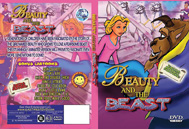

Phelous also makes a good point about the rosebush scene. Maybe if this film had the merchant hear a voice that invited him in, the merchant would look less greedy and culpable. But Phelous makes a very good point that, well, the reader may know…but that doesn’t mean that the merchant had proof that the food was in fact for him. Heck, I took it for granted because I, the reader, knew that the Beast had left the food for him, and in written versions, it’s clearly said that the food was intended for the merchant. I suppose that back when the story was written, the notion of hospitality was so ingrained into the culture that the merchant just assuming that the food was left for him, despite never seeing or hearing his host, would have been taken for granted. Phelous’ commentary on the father welcoming himself into the castle and helping himself to the Beast’s food is both hilarious and spot-on.
Goodtimes entertainment beauty and the beast movie#
So, this movie could have cut them out entirely (as did basically every other version of this story) and nothing would have been lost. As one-dimensional as the sisters are, at least their personalities are clear and they have a role in the story: they hate their sister and serve as her obstacle towards happiness with the Beast. They have no personality or impact on the story whatsoever. Do they care about Beauty/Belle? Do they dislike her? Are they indifferent to her? What do they think about the way that their other sisters are treating her? Do they even notice how spiteful and petty the sisters are? We don’t know. We never see what kind of relationship they have with their youngest sister. And after Beauty/Belle goes off to the castle, they just vanish from the story. The brothers make one attempt to be relevant by suggesting that they go after the Beast, but that’s quickly squashed. The father doesn’t ask them if they want gifts, no, he only asks his daughters so that the reader gets to see which women are shallow and which ones are humble. I have no idea why Suzanne Barbot de Villeneuve even wrote them to begin with, because they don’t do anything. The reason why most people don’t know that Beauty/Belle had brothers in the original version and why they’re omitted from almost every version of the fairytale that I’ve seen is that the brothers are some of the most pointless and useless characters I’ve ever seen in a story. Phelous rightly points out that the brothers are basically background props and have no effect on the story…but that’s exactly how they were in the original story. And here’s a point that I’d like to bring up about adaptations (which is the big reason for why I’m commenting on this video). I will say that the voice actress does do a fairly good job, though. Dear Lord, Beauty’s eyes are vacant in this version.

Although, to be fair, they were still pretty in the original fairytale, it’s just that Beauty/Belle was the most beautiful. Shallow, jealous, and spiteful towards their more beautiful and humble sibling. As for Phelous saying that this movie turned Belle’s sisters into the Wicked Stepsisters from “Cinderella”…that’s pretty much how they were characterized in the original fairytale. The father doesn’t get a name in this version probably because he never got a name in the original fairytale. But Phelous’ impersonation of him is still hilarious.

I actually found the father’s voice very annoying, since the voice actor constantly stammers and makes dithering noises in between almost every sentence he says to the point where I wonder if the voice actor was trying to give him a speech impediment. But in between my ramblings will be comparisons with and discussion of the original versions of the fairytales: the first by Suzanne Barbot de Villeneuve and the second (but more widely known) version by Jeanne-Marie Prince de Beaumont. Another ThatGuyWithTheGlasses review on a version of "Beauty and Beast!" This time, I'll provide commentary for Phelous's first review on a "Beauty and the Beast" adaptation: and.


 0 kommentar(er)
0 kommentar(er)
